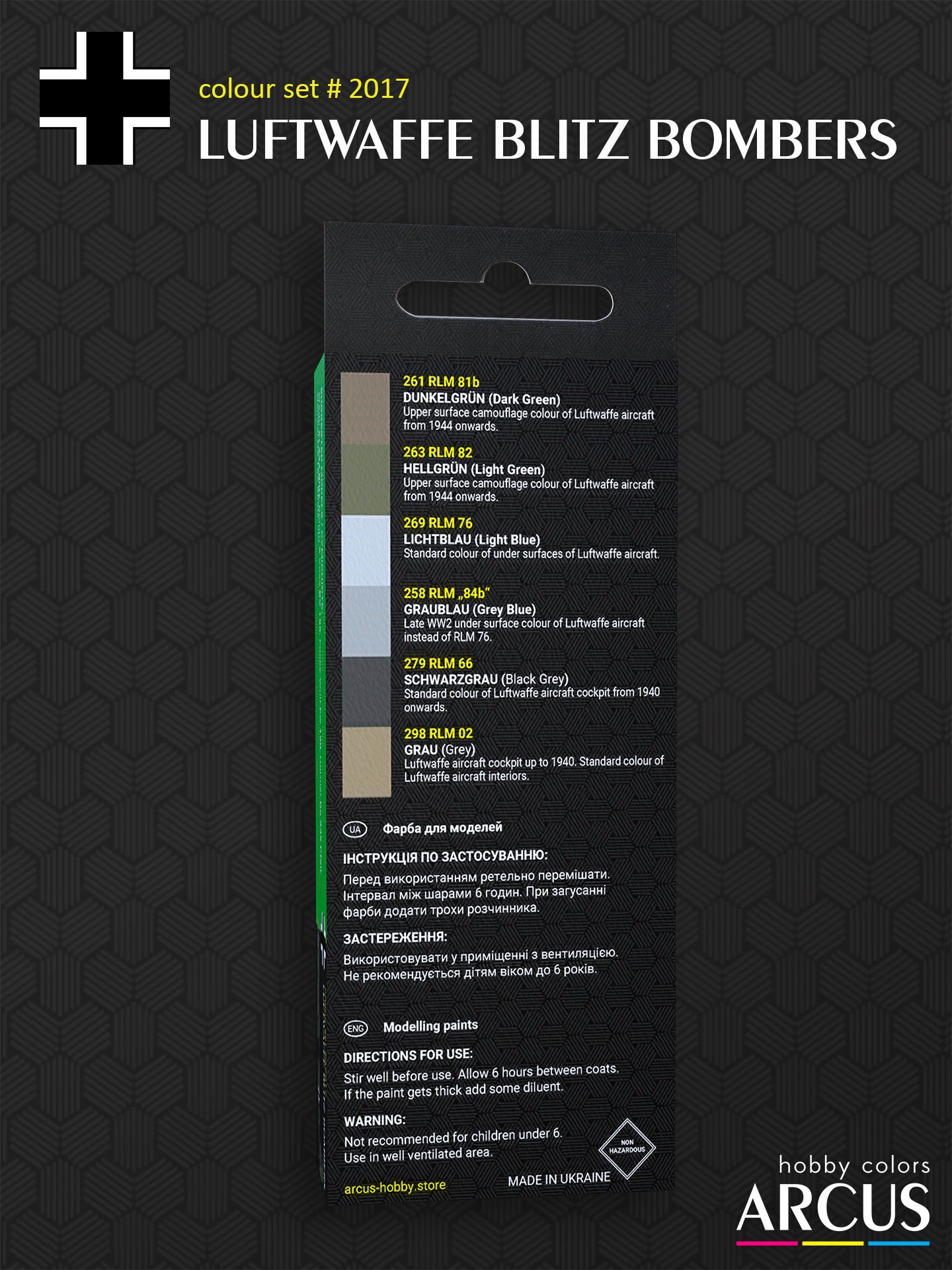Arcus Hobby
Paint Set 2017 Luftwaffe Blitz Bombers
Couldn't load pickup availability
Luftwaffe Blitz Bombers
In the latter stages of World War II, the Luftwaffe, Germany's air force, showcased several innovative aircraft designs and prototypes amidst the backdrop of dwindling resources and Allied air superiority.
One notable example is the Heinkel He 162 Volksjäger, or "People's Fighter." Designed as a cost-effective and quickly producible jet-powered interceptor, the He 162 promised high performance. However, plagued by reliability issues and material shortages, only a small number entered service before the war's end.
Another intriguing aircraft was the Blohm & Voss BV 155, envisioned as a high-altitude reconnaissance aircraft. Featuring a distinctive gull-wing design and powered by a potent inline engine, the BV 155 aimed to operate beyond the reach of Allied interceptors. Despite its promising concept, only a handful of prototypes were completed, and the aircraft never saw operational use.
The Dornier Do 335 Pfeil, or "Arrow," represented another innovative design with its unique push-pull engine configuration. This heavy fighter boasted impressive speed and firepower, making it a formidable adversary. However, production delays and Allied bombing raids severely hampered its deployment, and only a few entered combat before the war's end.
Amidst these innovations, the Arado Ar 234 Blitz stood out as the world's first operational jet-powered bomber and reconnaissance aircraft. With its sleek design and advanced performance, the Ar 234 offered unprecedented speed and altitude capabilities. However, production challenges and the relentless Allied advance limited its impact on the outcome of the war, despite its significant technological advancement.
These aircraft, though showcasing remarkable ingenuity, were ultimately unable to stem the tide of Allied air power. As the war drew to a close, they stood as symbols of the Luftwaffe's determination to adapt and innovate in the face of overwhelming odds.
Use Guide for the Set Luftwaffe Blitz Bombers
- In 1944, a new green camouflage scheme was approved for Luftwaffe aircraft, as per GL/C-E 10 Nr.10585/43 (IVE) Az.82b and Sammelmitteilung Nr. 2.
- This updated scheme introduced two green shades, RLM 81 Dunkelgrün and RLM 82 Hellgrün, replacing the previous RLM 70 Schwarzgrün and RLM 71 Dunkelgrün on bombers, and RLM 74 Dunkelgrau and RLM 75 Mittelgrau on fighters, respectively.
- The undersides were to be painted with the fighter color RLM 76 Lichtblau. However, towards the war's end, this color could vary significantly, ranging from standard light blue to gray-blue and gray-green. The latter two were classified as variations of color "84," though they were not officially documented.
- Internally, aircraft surfaces were coated with RLM 02 RLM-Grau, except for pilot cabins, which were painted in the black-grey shade RLM 79 Schwarzgrau.
Set Luftwaffe Blitz Bombers Includes:
- 261 RLM 81b Dunkelgrün (Dark Green) - A dark khaki green camouflage color of the upper surfaces.
- 263 RLM 82 Hellgrün (Light Green) - A medium olive green camouflage color of the upper surfaces.
- 269 RLM 76 Lichtblau (Light Blue) - A light blue standard color for the lower surfaces.
- 258 RLM 84b Graublau (Gray Blue) - A grayish-blue variation of the color RLM 76 used for the lower surfaces.
- 279 RLM 66 Schwarzgrau (Black Grey) - A dull gray, almost black color used for aircraft cockpits.
- 298 RLM 02 RLM-Grau (Gray) - A yellowish-gray color of aircraft interiors.
Collection:
This Set is Best for:
- Arado Ar 234 Blitz
- Blohm & Voss BV 155
- Focke-Wulf Fw 190
- Dornier Do 335 Pfeil
- Heinkel He 162 Spatz, etc
Paint Type:
- Acrylic A2017
- Enamel E2017
Paint Finish:
- Semi-gloss
Capacity:
- 6 x 10 ml. (6 x 0.33oz)





